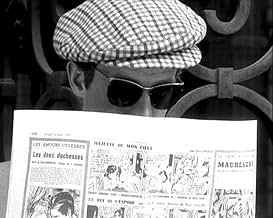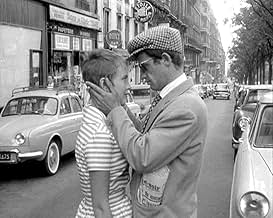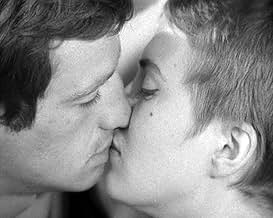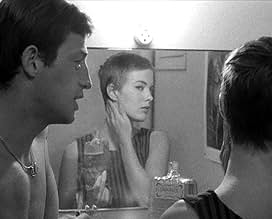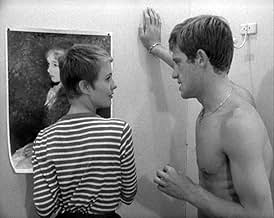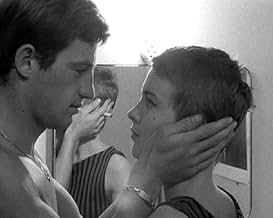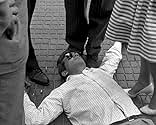Um pequeno ladrão rouba um carro e mata impulsivamente um policial. Procurado pelas autoridades, ele conhece um estudante de jornalismo e tenta convencê-la a fugir com ele para a Itália.Um pequeno ladrão rouba um carro e mata impulsivamente um policial. Procurado pelas autoridades, ele conhece um estudante de jornalismo e tenta convencê-la a fugir com ele para a Itália.Um pequeno ladrão rouba um carro e mata impulsivamente um policial. Procurado pelas autoridades, ele conhece um estudante de jornalismo e tenta convencê-la a fugir com ele para a Itália.
- Direção
- Roteiristas
- Artistas
- Indicado para 1 prêmio BAFTA
- 5 vitórias e 4 indicações no total
Jean-Paul Belmondo
- Michel Poiccard a.k.a. Laszlo Kovacs
- (não creditado)
Jean Seberg
- Patricia Franchini
- (não creditado)
Richard Balducci
- Tolmatchoff
- (não creditado)
Daniel Boulanger
- Police Inspector Vital
- (não creditado)
Gérard Brach
- Photographer
- (não creditado)
Philippe de Broca
- A Journalist
- (não creditado)
José Bénazéraf
- Man in a White Car
- (não creditado)
Jean Domarchi
- A Drunk
- (não creditado)
Jean Douchet
- A Journalist
- (não creditado)
Liliane Dreyfus
- Liliane
- (não creditado)
- …
Michel Fabre
- Police Inspector #2
- (não creditado)
Jean-Luc Godard
- The Snitch
- (não creditado)
Roger Hanin
- Carl Zubart
- (não creditado)
Henri-Jacques Huet
- Antonio Berrutti
- (não creditado)
Raymond Huntley
- A Journalist
- (não creditado)
André S. Labarthe
- Journalist at Orly
- (não creditado)
- Direção
- Roteiristas
- Elenco e equipe completos
- Produção, bilheteria e muito mais no IMDbPro
Avaliações em destaque
So says the novelist in response to Patricia's question, "What do you hope to attain out of life?" That response is the philosophy of the film and of every character in the film. All want to be in control of their destiny. All want to be something that they are not. None are able to do any of these things. They are all contradictions. How can you die as an immortal? How can Patricia be free and independent is so many other things determine what she can do? How can this film transcend the screen while existing on the screen? This is an amazing film to watch. Goddard fills every scene with ingenuity and energy. He puts his actors in a beautiful environment and lets them do their thing. And they do it extremely well. The actors are beautiful. Not just cosmetically, but spiritually and psychologically. I am not sure that I liked either of the two main characters. I am sure I could not keep my eyes off them. I could not take my eyes off the screen. Techniques that novices today use for no substantial purpose are utilized by Goddard to amazing effect. The greatest filmmakers are the great editors. Goddard makes the editing a character itself. It is the nervous narrator hurrying the film along. It breathlessly awaits the next scene, and leads us to do the same. I like the way Goddard spends prodigious time simply watching his characters. The conversation scene at the center of the film is amazingly long and drawn out, yet I did not find it boring. I found it fascinating. People are fascinating. Everyone is trying to be something. It takes tremendous talent to indulge in the minutiae of existence. A great film.
This is the one that started it all kids, the daddy of post-modern cinema. MTV jump cuts, fractured soundtrack and images aplenty
Self reflexive to the point that it not only acknowledges its own existence, it revels in it.
All style and no substance is considered a bad thing today, unless its Tarantino. Well, if it wasn't for Godard, chances are there would be no QT.
All the characters and images, and dialogue and sets are constructed from all aspects of life - Michel is a Bogart collage. Patricia apes everything she sees, from her Interviewee's facial gestures to Michel's own.
Don't let all this technical mumbo fool you, I did my thesis on Godard and would happily bore the ass off you with a lecture in great detail about this film, but the fact is, it's a stormer.
Grips you by the throat and shakes the hell out of you, and it doesn't let go until the final breath.
Fantastically, artistically magnificent. If Godard wanted to make his debut picture to show how well he understood American ideals and the history of cinema, he couldn't have made a better picture.
Top stuff French guy.
Self reflexive to the point that it not only acknowledges its own existence, it revels in it.
All style and no substance is considered a bad thing today, unless its Tarantino. Well, if it wasn't for Godard, chances are there would be no QT.
All the characters and images, and dialogue and sets are constructed from all aspects of life - Michel is a Bogart collage. Patricia apes everything she sees, from her Interviewee's facial gestures to Michel's own.
Don't let all this technical mumbo fool you, I did my thesis on Godard and would happily bore the ass off you with a lecture in great detail about this film, but the fact is, it's a stormer.
Grips you by the throat and shakes the hell out of you, and it doesn't let go until the final breath.
Fantastically, artistically magnificent. If Godard wanted to make his debut picture to show how well he understood American ideals and the history of cinema, he couldn't have made a better picture.
Top stuff French guy.
Jean-Luc Godard intended to shake the delicate world of cinema, that much is obvious. But did he intend to reinvent it? Whether it was his intention or not isn't the point, the point is this; he did. Jean-Luc Godard, and Francois Truffuat are the undisputed fathers of the French New Wave. Some cinephiles or historians may feel like pointing elsewhere, to Jean Renoir for example, protesting that he is truly the father of the French New Wave, I disagree entirely. The French New Wave was a product of the kindred spirits and talents of Godard and Truffaut. And no other film represents the French New Wave more coherently than Jean-Luc Godard's dazzling 1960 picture, 'Breathless'. Unorthodox and uninhibited. Raw and experimental. Godard broke every rule in the book, disavowed the laws of cinema, and scribed a new rule book, one where the pages are blank, and possibilities are endless. The story is so simple I can summarize the entire film in half of a sentence, but I refuse to give you or Godard the satisfaction. What counts in Breathless is not the story, but how the story is told. The very definition of 'cool', the film is robust in creativity, and exuberant in its flaws, and passionate about its reckless behavior. Self aware and rebellious. If there was no breathless, there would have been no Tarantino, if there was no French New Wave, the streak of genius that ran through the nineties and 2000s wouldn't have existed. Before Breathless, it was believed that films took money, that you had to find yourself in a place of authority to make a film. Breathless broke this misconception. Breathless makes you want to run outside and make the film of your life. Breathless made that possible, Breathless made the amateur the auteur, Breathless reinvented the face of the cinema, and made you believe that could too. All you need is a girl and gun.
10IZMatt
I don't blame those who state that they do not "understand" the superlatives surrounding Jean-Luc Godard's 1960 masterpiece, Breathless. It's primarily because to appreciate Breathless, one has to view the movie from a historical context, which also requires studying of not only the French New Wave, but film theories as a whole, and the lives of those apart of the New Wave. Breathless accomplished many things unprecedented prior (many completely unprecedented, but some things are not-so-much).
Roger Ebert put it best when he said that just as film fanatics may now stand outside a movie theatre waiting for the next Quentin Tarantino movie to be released, film enthusiasts were doing so for Godard in the 1960s. He was a revolutionary, which is why MovieMaker magazine called him the 4th most influential director of ALL-TIME (only behind Welles, Griffith, and Hitchcock)! What did Godard do different? Breathless is all style, simple as that. The story line is interesting, yes, but is Godard's aesthetics, production modes, subject matters, and storytelling methods that are key. First of all, the whole movie was shot on a hand-held camera, just like most all New Wave pictures. It was, however, only shot by two people (Godard and his cinematographer, Rouald) on a budget that did not top $50,000, a mere fraction of what most pictures cost at the time (another facet of the New Wave). It was shot completely on location in Paris, and utilized new film-making techniques that would be used by film-making students for decades to come (such as putting the camera in a mail cart on the Champs Elysees and following Belmondo and Seberg). Note Godard's use of American cinema influence, and how the montage art of the 1950s impacted this aesthetic.
(A brief New Wave lesson: Most New Wave directors were displeased with the "tradition of quality," or the older generation directors who, as Truffaut put it, made the "twelve or so" pictures per year that represented France at Venice and Cannes. Most of these pictures classic or modern literary adaptations, completely stagnant in artistic quality with rehashed subject matters based on historical periods. New Wave directors supported NEW tales of modern Parisian life, primarily, and were sick of the themes found in the tradition of quality films.) The storytelling methods in Breathless are perhaps the most fascinating part of the film. The jump cuts may seem lame, but one must again view them from a historical context: it had never been done before. This is exactly why Breathless is important -- practically every technique was revolutionary. They are so submerged into film-making practices now that Breathless seems typical. Yet at the time, it was, as I said prior, unprecedented.
Roger Ebert put it best when he said that just as film fanatics may now stand outside a movie theatre waiting for the next Quentin Tarantino movie to be released, film enthusiasts were doing so for Godard in the 1960s. He was a revolutionary, which is why MovieMaker magazine called him the 4th most influential director of ALL-TIME (only behind Welles, Griffith, and Hitchcock)! What did Godard do different? Breathless is all style, simple as that. The story line is interesting, yes, but is Godard's aesthetics, production modes, subject matters, and storytelling methods that are key. First of all, the whole movie was shot on a hand-held camera, just like most all New Wave pictures. It was, however, only shot by two people (Godard and his cinematographer, Rouald) on a budget that did not top $50,000, a mere fraction of what most pictures cost at the time (another facet of the New Wave). It was shot completely on location in Paris, and utilized new film-making techniques that would be used by film-making students for decades to come (such as putting the camera in a mail cart on the Champs Elysees and following Belmondo and Seberg). Note Godard's use of American cinema influence, and how the montage art of the 1950s impacted this aesthetic.
(A brief New Wave lesson: Most New Wave directors were displeased with the "tradition of quality," or the older generation directors who, as Truffaut put it, made the "twelve or so" pictures per year that represented France at Venice and Cannes. Most of these pictures classic or modern literary adaptations, completely stagnant in artistic quality with rehashed subject matters based on historical periods. New Wave directors supported NEW tales of modern Parisian life, primarily, and were sick of the themes found in the tradition of quality films.) The storytelling methods in Breathless are perhaps the most fascinating part of the film. The jump cuts may seem lame, but one must again view them from a historical context: it had never been done before. This is exactly why Breathless is important -- practically every technique was revolutionary. They are so submerged into film-making practices now that Breathless seems typical. Yet at the time, it was, as I said prior, unprecedented.
Together with François Truffaut's "The 400 Blows" (one of my favorites), Jean-Luc Godard's "Breathless" is considered the defining, instigating film of the French New Wave. It's more ironic and detached, less emotionally accessible than "The 400 Blows," and its technical innovations like jump cuts are perhaps even more surprising. For these reasons, I found "Breathless" easier to admire than to lovethough by the end I grew to enjoy its too-cool- for-(film)-school tone.
Ironically, the pace of this movie isn't "breathless" at all. It begins abruptly and takes a while to get going: Michel (Jean-Paul Belmondo), a character we barely know, drives a stolen car around, talks at the camera, and shoots a police officer who has tried to pull him over. Then he goes to Paris and tries to borrow money from some friends, while the police-shooting plot goes undeveloped. I only became fully engaged with the introduction of Patricia (Jean Seberg), a young American who sells newspapers on the Champs-Elysees. The relationship between Michel and Patricia is the heart of the film, especially a 25-minute-long scene in Patricia's apartment where the characters smoke, flirt, and laze around in bed, though nothing really happens. That's where I really started to admire "Breathless," because I was so captivated by a scene that, on paper, doesn't sound all that captivating.
Eventually the police catch onto Michel and launch a manhunt, but this doesn't really ratchet up the suspense. Instead, Michel is (or at least, Michel acts) aimless and nonchalant about the whole thingthis is not a typical "man on the run" movie. The cool jazz score adds to the hip, laid-back tone.
Since I didn't care for the movie too much until the scenes between Michel and Patricia, I believe a lot of the credit for the film's success has to go to the charismatic performances of Belmondo and Seberg. Belmondo, with a perpetual cigarette dangling from the corner of his mouth, is the archetypal cocky criminal who models himself after Humphrey Bogart (there's a great scene where he sees some Bogart photos and gets a vulnerable look in his eyes, as though saying "I'll never be as cool as this"). Seberg plays Patricia as a confused girl who is delighted by the attention she gets as an American in France.
It's easy to see why "Breathless" was so influentialthe jump cuts, the ragged style perfectly match this story about amoral, aimless youth. Definitely a movie that expanded the range of stories the cinema can tell, and perhaps a major precursor to youth-oriented '60s culture. Nearly fifty years later, it still seems "hip," and still challenges our expectations of how movies should behave.
Ironically, the pace of this movie isn't "breathless" at all. It begins abruptly and takes a while to get going: Michel (Jean-Paul Belmondo), a character we barely know, drives a stolen car around, talks at the camera, and shoots a police officer who has tried to pull him over. Then he goes to Paris and tries to borrow money from some friends, while the police-shooting plot goes undeveloped. I only became fully engaged with the introduction of Patricia (Jean Seberg), a young American who sells newspapers on the Champs-Elysees. The relationship between Michel and Patricia is the heart of the film, especially a 25-minute-long scene in Patricia's apartment where the characters smoke, flirt, and laze around in bed, though nothing really happens. That's where I really started to admire "Breathless," because I was so captivated by a scene that, on paper, doesn't sound all that captivating.
Eventually the police catch onto Michel and launch a manhunt, but this doesn't really ratchet up the suspense. Instead, Michel is (or at least, Michel acts) aimless and nonchalant about the whole thingthis is not a typical "man on the run" movie. The cool jazz score adds to the hip, laid-back tone.
Since I didn't care for the movie too much until the scenes between Michel and Patricia, I believe a lot of the credit for the film's success has to go to the charismatic performances of Belmondo and Seberg. Belmondo, with a perpetual cigarette dangling from the corner of his mouth, is the archetypal cocky criminal who models himself after Humphrey Bogart (there's a great scene where he sees some Bogart photos and gets a vulnerable look in his eyes, as though saying "I'll never be as cool as this"). Seberg plays Patricia as a confused girl who is delighted by the attention she gets as an American in France.
It's easy to see why "Breathless" was so influentialthe jump cuts, the ragged style perfectly match this story about amoral, aimless youth. Definitely a movie that expanded the range of stories the cinema can tell, and perhaps a major precursor to youth-oriented '60s culture. Nearly fifty years later, it still seems "hip," and still challenges our expectations of how movies should behave.
Você sabia?
- CuriosidadesDespite reports to the contrary, Jean-Luc Godard did not shoot the film without a script; however, he did not have a finished script at the beginning, instead writing scenes in the morning and filming them that day. See also O Demônio das Onze Horas (1965).
- Erros de gravaçãoDuring street shots, countless passersby look at Patricia and Michel and stare into the camera, revealing that the shots were made without filming barriers and simply used street pedestrians in place of extras.
- Citações
Patricia Franchini: What is your greatest ambition in life?
Parvulesco: To become immortal... and then die.
- ConexõesEdited into Pariz pripada nama! (2016)
Principais escolhas
Faça login para avaliar e ver a lista de recomendações personalizadas
Detalhes
- Data de lançamento
- País de origem
- Idiomas
- Também conhecido como
- Sin aliento
- Locações de filme
- 11 rue Campagne Première, Paris 14, Paris, França(on location)
- Empresas de produção
- Consulte mais créditos da empresa na IMDbPro
Bilheteria
- Orçamento
- FRF 400.000 (estimativa)
- Faturamento bruto nos EUA e Canadá
- US$ 414.173
- Fim de semana de estreia nos EUA e Canadá
- US$ 32.424
- 30 de mai. de 2010
- Faturamento bruto mundial
- US$ 594.039
- Tempo de duração1 hora 30 minutos
- Cor
- Mixagem de som
- Proporção
- 1.37 : 1
Contribua para esta página
Sugerir uma alteração ou adicionar conteúdo ausente






